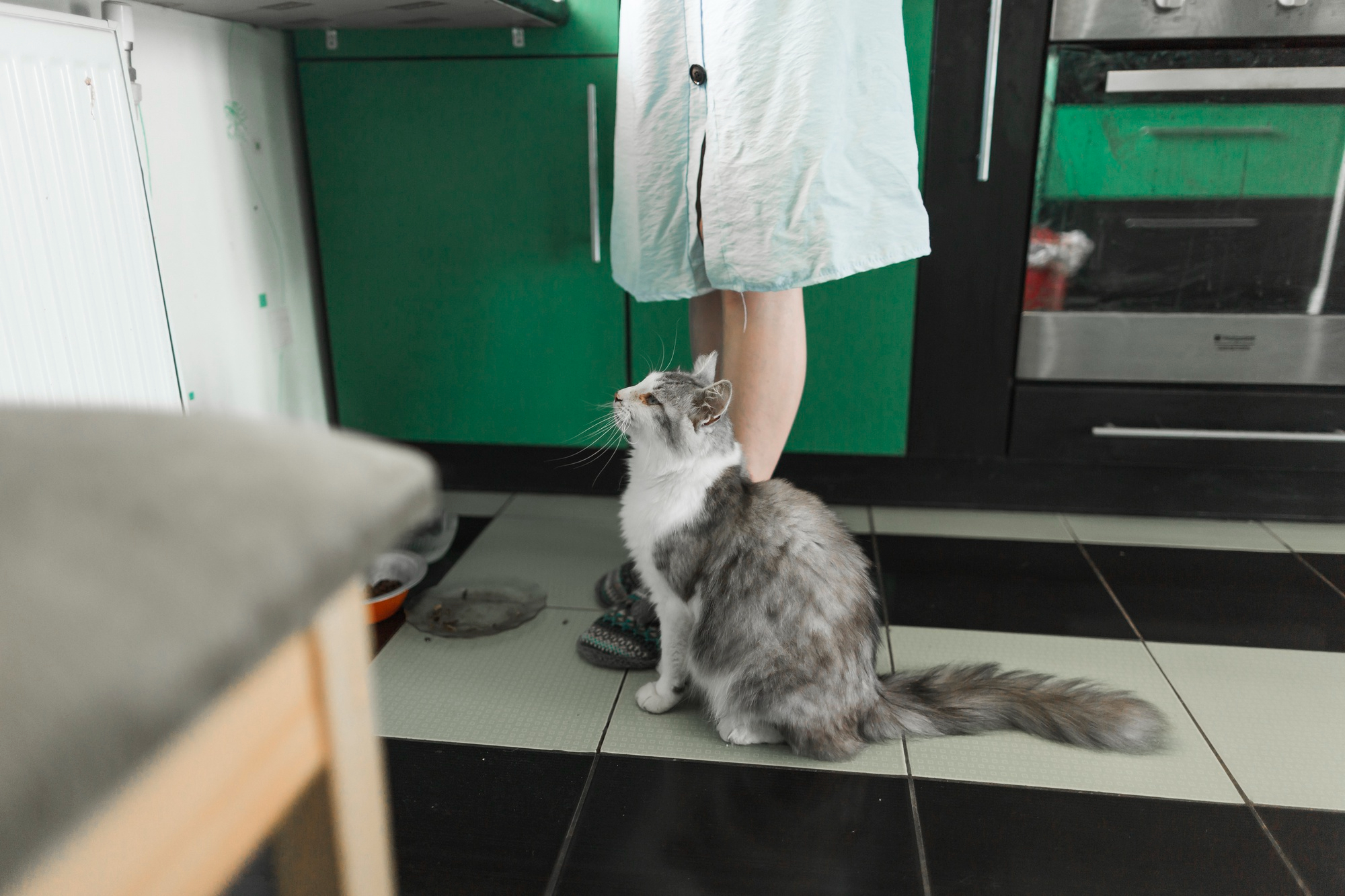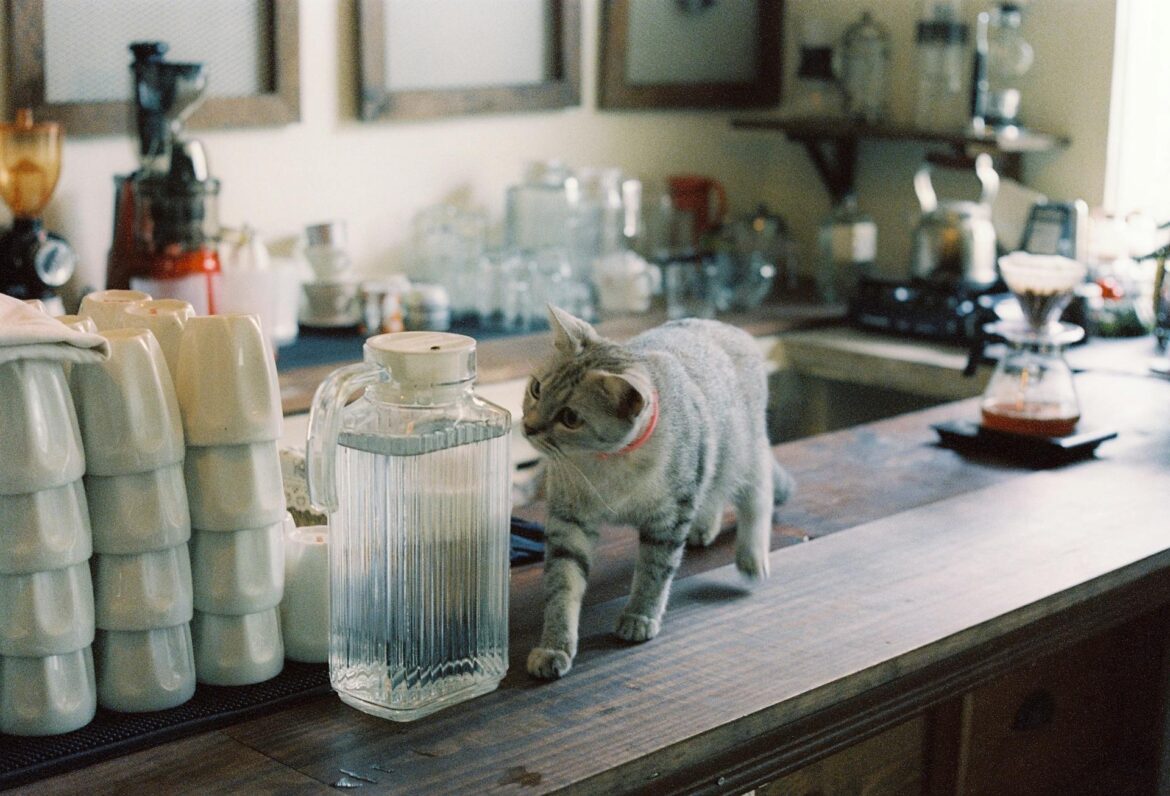Many cat owners face the challenge of keeping their cats off the kitchen counter. Cats are naturally curious creatures who enjoy exploring, especially high spaces where they feel safe and in control. However, counters can be unsafe for cats due to hot stoves, sharp objects, and other hazards. This article offers practical and easy-to-follow ways to keep your cat off the kitchen counter while ensuring they’re happy and healthy. Let’s explore these solutions!
Table of Contents
ToggleSection 1: Why Do Cats Jump on Kitchen Counters?
Understanding Cat Behavior
- Curiosity
Cats are naturally curious. They love to explore new spaces, and counters often offer exciting things to see, smell, and investigate. - Seeking High Ground
Cats feel secure in high places, as it allows them to survey their surroundings. Counters offer a view of the entire room, making cats feel safe. - Looking for Food
Cats are skilled at sniffing out food, and they may jump onto counters if they smell leftovers or crumbs. PetMD explains more about why cats love high places. - Warmth
Kitchen counters near stoves or appliances can be warm spots, which cats naturally seek out, especially during colder months.

Understanding these motivations is key to keeping your cat off the counter. By addressing these needs, you can make other spaces more appealing and safe for your feline friend.
Also Read: How to Get Rid of Pet Odors in Your Home: A Complete Guide
Section 2: Top 10 Ways to Keep Your Cat Off the Kitchen Counter
Practical Tips to Keep Your Feline Friend Grounded
1. Create Cat-Friendly High Spaces
Provide Alternatives
Give your cat a tall scratching post or cat tree near the kitchen. This way, they have a designated high place to observe from without being on the counter. Place the cat tree in a spot where they can still see the kitchen if they enjoy being near you. Popular options like the Frisco Cat Tree on Chewy are great choices that give cats height and stimulation.
2. Keep Food and Crumbs Off the Counter
Make Counters Less Tempting
Cats often jump on counters to find food. Keeping the area clean and free of crumbs or food smells can make it less appealing. Wipe down counters after each meal and store food in closed containers. By removing the attraction of food, you’re helping to prevent your cat from getting curious.

3. Use Double-Sided Tape
Cats Dislike Sticky Surfaces
Cats generally dislike the feeling of sticky surfaces on their paws. Placing double-sided tape along the edge of your counter can deter them from jumping up. After a few times, your cat will likely stop attempting to jump up. PetSafe Sticky Paws offers pet-safe adhesive strips that work well for this purpose.
4. Introduce Scents Cats Dislike
Citrus and Herbal Scents
Cats dislike certain scents, especially citrus, lavender, and rosemary. You can use a natural spray or leave a small bowl of citrus peels on the counter as a gentle deterrent. Avoid harsh chemical sprays, as they may be harmful to cats. PetSafe’s cat-safe deterrent spray is an excellent choice for cat owners.
5. Use Aluminum Foil
Cats Don’t Like the Texture
Aluminum foil has a crinkly texture that most cats dislike. Try placing a sheet of foil on the counter when you’re not using it. The feel and sound of foil under their paws will make your cat think twice before jumping up.
6. Provide Engaging Toys and Enrichment
Distract Your Cat with Fun Activities
Cats often jump on counters out of boredom. Providing them with toys, puzzle feeders, or interactive toys can keep them occupied and away from the counter. Cats are less likely to misbehave when they’re mentally and physically stimulated. Chewy’s interactive cat toys has some excellent options to keep your cat entertained.
7. Use a Motion-Activated Pet Deterrent
Let Technology Do the Work
Motion-activated pet deterrents like the Ssscat Spray release a harmless puff of air when a cat approaches. The sudden sound and sensation will discourage your cat from jumping on the counter. Over time, they’ll learn to avoid the area even without the deterrent.
8. Reward Good Behavior
Positive Reinforcement
Reward your cat with treats, praise, or petting when they stay off the counter. Cats respond well to positive reinforcement, so when they choose to use their cat tree or stay on the floor, give them a treat. This teaches them that staying off the counter is a good thing and encourages them to repeat the behavior.
9. Cover Countertops with a Comfortable Mat in Their Spot
Give Them a Cozy Alternative
Some cats like to be near you in the kitchen. Place a small mat or cat bed on the floor or another area where they can relax and watch. When they lie on the mat instead of jumping up, praise them or offer a treat. Frisco’s cat bed collection on Chewy offers comfortable options your cat might enjoy.
10. Be Consistent and Patient
Cats Need Time to Learn
Training a cat to stay off the counter takes time. Be consistent in your methods, whether it’s using deterrents or rewarding good behavior. Cats are intelligent and will eventually learn, but it requires patience and repetition. Avoid scolding, as it can create fear rather than understanding. By sticking to a routine, your cat will gradually learn the kitchen counter is off-limits.
Also Read: Do Dogs Dream? What Do Dogs Dream About?
Section 3: Other Tips for Keeping Cats Off Counters
Additional Suggestions
- Close Off the Kitchen When Possible
If your kitchen has doors, close them when you’re not using the space. Limiting access can be an effective way to keep your cat out. - Train Your Cat with Verbal Cues
Use a specific word or sound each time your cat attempts to jump on the counter. Over time, they’ll understand this cue means they shouldn’t jump up. - Use Vertical Spaces Elsewhere
Provide shelves or window perches that give your cat safe, designated high spots to explore. Check out Wayfair’s selection of cat wall shelves for ideas. - Avoid Punishments
Avoid punishment, like spraying water or scolding. This can create fear and stress in your cat. Instead, use gentle redirection or deterrents. - Use a Consistent Feeding Schedule
Feeding your cat at the same time each day reduces their need to search for food on the counter.
Conclusion
Keeping Your Cat Off the Kitchen Counter Takes Time and Patience
It’s normal for cats to be curious about kitchen counters, but with a combination of alternative spaces, deterrents, and positive reinforcement, you can teach them to stay away. Remember, consistency is key, and each cat is unique. By using these tips, you can enjoy a safe, clean kitchen while keeping your cat happy.
FAQ: Top 10 Ways to Keep Your Cat Off the Kitchen Counter
1. Why do cats love jumping on kitchen counters?
Answer: Cats are naturally curious and enjoy exploring high spaces, as it provides a sense of security and control over their environment. Kitchen counters offer an elevated vantage point where cats can observe their surroundings. Additionally, counters are often filled with interesting smells from food, making them even more appealing. By understanding that this behavior is instinctive, you can focus on creating alternative high spaces that fulfill this need without risking their safety on the counter.
2. How can I make the counter less appealing to my cat?
Answer: Making the counter unattractive to your cat is one of the most effective deterrents. Start by thoroughly cleaning the counter after each meal to remove any food scents. Cats are also sensitive to certain textures and scents; placing aluminum foil, double-sided tape, or a citrus-scented deterrent can discourage them. Cats dislike the feel of sticky tape and the smell of citrus, which makes them think twice before jumping up.
3. Are there any safe, natural deterrents to keep cats off the counter?
Answer: Yes, there are safe and natural deterrents you can use. Cats generally dislike the smell of citrus, so you can place a few orange or lemon peels on the counter (but keep them out of reach to avoid ingestion). Another option is a pet-safe citrus spray that can be spritzed on the counter. Lavender and rosemary are also scents cats tend to avoid. However, always ensure that any deterrent you use is safe for cats, as some essential oils can be toxic.
4. What type of alternative high spaces should I provide?
Answer: Cats love high spots, so providing alternative high spaces can keep them away from the kitchen counter. A tall scratching post, cat tree, or wall-mounted shelves specifically for cats can satisfy their climbing instincts. Make sure these alternatives are placed in areas where your cat can observe their surroundings comfortably. If the kitchen is where they enjoy being, try placing the cat tree nearby, so they can watch you without needing to climb onto the counter.
5. Is using double-sided tape on the counter effective?
Answer: Yes, double-sided tape can be very effective in deterring cats from the counter. Cats dislike the sticky sensation on their paws, so after a few attempts, they usually avoid jumping on the taped areas. Use a pet-safe double-sided tape, such as Sticky Paws, designed for this purpose. Test the tape on a small area of the counter first to ensure it doesn’t leave a residue or damage the surface.
6. Will a motion-activated deterrent scare or harm my cat?
Answer: Motion-activated deterrents are designed to surprise but not harm pets. Devices like the Ssscat Spray release a harmless puff of air that startles your cat, deterring them from the counter. While the initial surprise might cause them to jump down quickly, these devices are generally safe and won’t hurt your cat. Over time, your cat may learn to avoid the counter entirely, even without the deterrent.
7. Is rewarding good behavior effective in keeping cats off counters?
Answer: Yes, positive reinforcement is an excellent way to encourage your cat to stay off the counter. Whenever your cat uses an alternative space, such as a cat tree or a designated spot, reward them with a treat, praise, or petting. Cats respond well to positive reinforcement, and associating their behavior with a reward helps them understand what you expect. Avoid punishing your cat for counter-jumping, as this can lead to stress and doesn’t effectively teach them alternative behaviors.
8. How can I keep my cat entertained so they don’t jump on the counter out of boredom?
Answer: Keeping your cat mentally and physically stimulated can reduce counter-jumping caused by boredom. Interactive toys, puzzle feeders, and scheduled playtimes can help engage your cat’s natural hunting and problem-solving instincts. Cats who are busy and fulfilled with toys and activities are less likely to seek out the counter for entertainment. Consider rotating toys and introducing new ones periodically to maintain their interest. Chewy’s interactive cat toys are a great place to find engaging options.
9. Should I close off the kitchen to prevent my cat from accessing the counter?
Answer: If possible, closing off the kitchen can be a straightforward way to keep your cat off the counter. Baby gates or doors can work if your cat isn’t a skilled jumper. However, cats are agile and may find ways to climb over or around gates, so it’s not always foolproof. If you don’t have doors to close off the kitchen, use consistent deterrents and positive reinforcement to create a habit for your cat to stay away from the counter, even when they have access to it.
10. How long does it usually take to train a cat to stay off the counter?
Answer: Training a cat to stay off the counter requires patience and consistency, and the time it takes varies depending on the cat. Some cats respond quickly to deterrents and alternative spaces within a few days, while others may take weeks. It’s important to be consistent with whichever methods you choose—whether it’s using deterrents, rewarding good behavior, or providing alternatives. Avoid scolding or punishing your cat, as this can lead to stress and doesn’t teach them what behavior you want. With regular practice, most cats will learn to stay off the counter over time.
